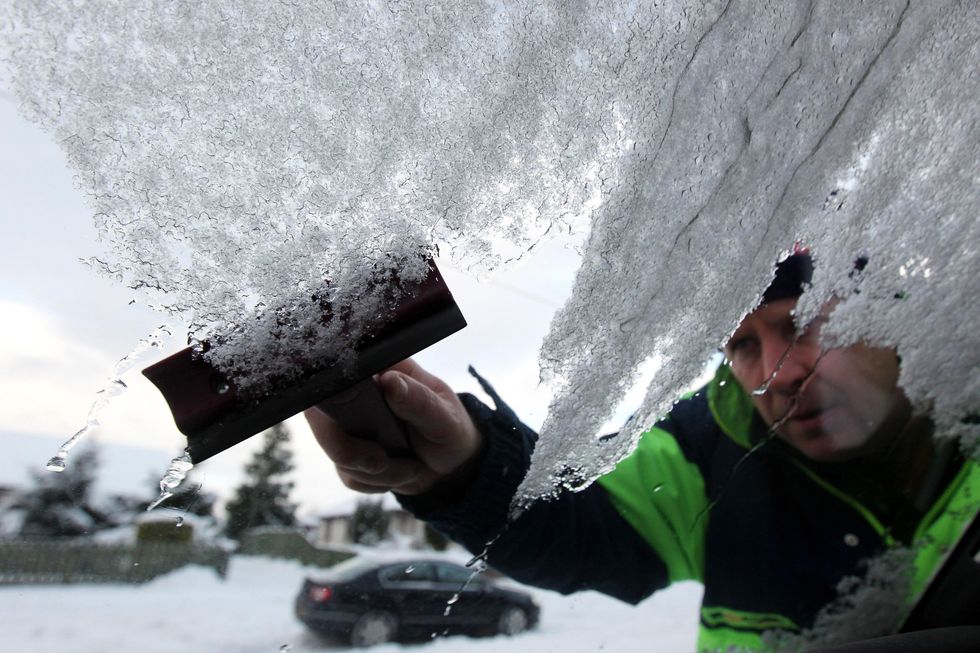Drivers warned they could be breaking the law if they DE-ICE their cars this winter

Andrew Milligan

As the cold winter mornings approach, many drivers will be faced with the dull task of de-icing their cars.
But a motoring lawyer has warned that those who leave their vehicle unattended as it de-ices could be invalidating their car insurance.
Car thieves are aware that some drivers will start their cars and head back inside their homes to give their vehicle screens time to clear – giving opportunistic crooks time to get in the car and drive away.
Peter BYrne
Nick Freeman, also known as Mr Loophole, has urged drivers to “stay in control” when their engine is running otherwise they are at risk of invalidating their car insurance for leaving it unattended.
“It may be tempting to get out of the car and leave the engine running when defrosting the car.
“But if you're on the road – rather than a private driveway- it's breaking the law.
“The Highway Code states that drivers are expected to always be always in control of their vehicle while the engine is running," he told the Express.
“You also take the risk of not being covered if your car is stolen.
“Most policies have a ‘keys exclusion’ clause, meaning that you won’t be covered if your car is stolen while you leave the engine running.”
Temperatures across the UK are starting to fall following a period of out-of-character mildness. With the weather only set to turn chillier over the next few months, cars up and down the country will be affected by this change.
But what happens to your car when the weather turns cold and is there anything you need to look out for?
Gareth Fuller
Batteries
During warmer temperatures, your battery isn’t under too much strain when it’s relied upon to get your car going. However, when things turn chillier, your car is put under extra pressure to deliver the right amount of energy to start your car’s engine.
So in the event of a snap, you might notice that your car struggles to start. Even though it may eventually get going, this delay is likely caused by a failing battery. It’s a good idea to get it checked out by a trained professional and, if necessary, replaced.
Tyre pressures
Falling temperatures can see your tyre pressures drop too. Even a slight decrease can have a big impact on how effectively your tyres grip, something you really don’t want on those slippery winter roads.
So if there has been a big change in exterior temperature, it’s a good idea to check your tyres over. You’ll be able to find your car’s recommended tyre pressures in the car’s handbook, behind the fuel filler door and sometimes inside the driver’s door shuts (the area underneath the door when it’s closed).
Wipers
Grit and grime both become a common occurrence on the UK’s roads in winter, which is why your wipers can often degrade more quickly than during the summer. You might notice that they’re not as effective at clearing a screen as before, while they might also make an unpleasant scrubbing noise.
The best way to solve this is to simply swap them out for a new set. This can be done easily yourself, though many car part suppliers will be able to do it for you too.
Spark plugs may misfire
In a petrol engine, spark plugs are absolutely essential as they’re a core part of the whole combustion process. If a spark plug has failed – and they often do during colder weather – you might sense that your car is down on power and doesn’t feel as keen to accelerate.
This is something you’ll need to have checked out by a garage. It’s also worth checking your servicing history to check the last time they were replaced.
Fluids can get thicker
Your car has all different types of fluids running through it. During colder temperatures, fluids such as your car’s oil can get thicker and not work as effectively, potentially exposing key parts of your engine to damage.
One of the best ways to combat this is to give your car 10 minutes to warm up prior to moving away. This gives those fluids a good opportunity to warm up and thin out.